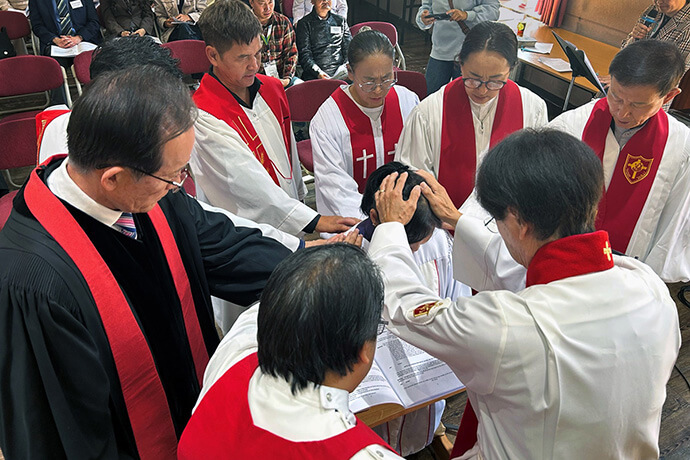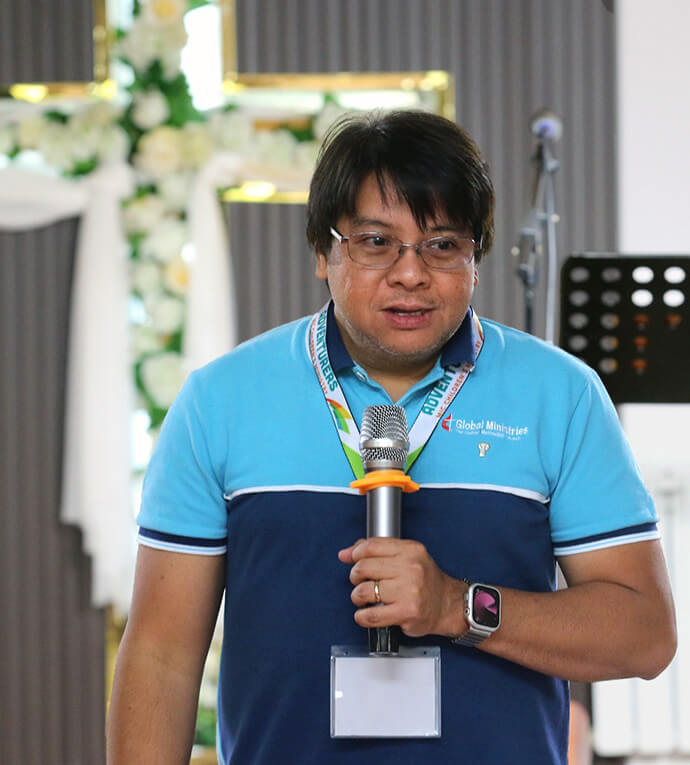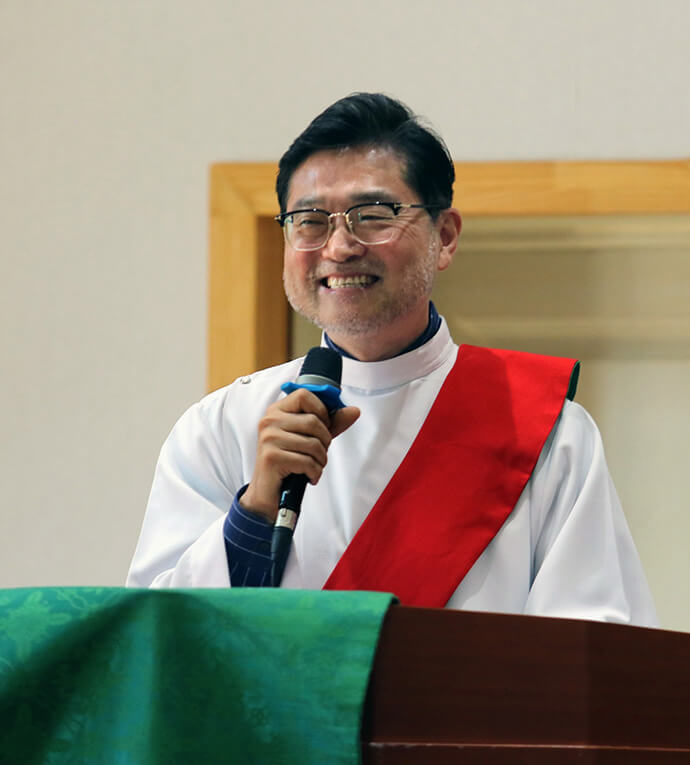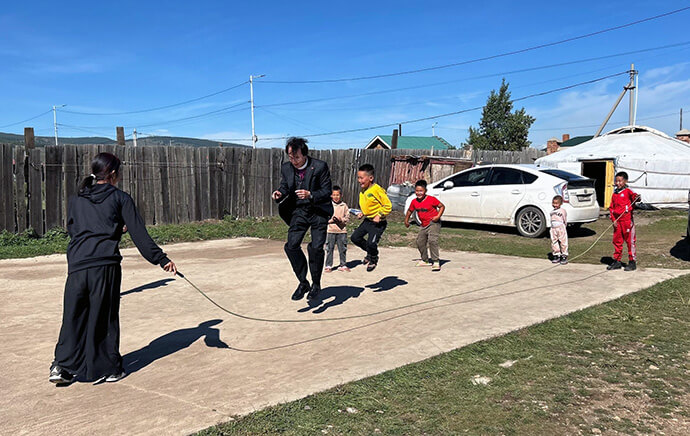Key points:
- The United Methodist Church’s Mongolia Mission Initiative marked its 23rd anniversary this year with joyful worship and renewed commitments to the future.
- Clergy and laity celebrated the ordination of a mission elder, the recognition of two newly licensed mission pastors and the commissioning of seven lay ministers.
- The Mongolia Mission traces its roots to 2002, when the United Methodist Board of Global Ministries sent the first United Methodist missionary to the country.
- The initiative has since grown into a network of 11 congregations and five mission organizations.
The United Methodist Church’s Mongolia Mission Initiative marked its 23rd anniversary this year with historic milestones, joyful worship and renewed commitments to the future.
At its annual meeting, held Aug. 29-31 in Ulaanbaatar, clergy and laity from across the vast nation celebrated the ordination of a mission elder, the recognition of two newly licensed mission pastors and the commissioning of seven lay ministers.

The Mongolia Mission traces its roots to 2002, when the United Methodist Board of Global Ministries sent the first United Methodist missionary to the country. A year later, the Korean United Methodist Church in America marked its centennial and the centennial of Korean immigration to the U.S. by launching the Centennial Church Project in Mongolia.
The project gave birth to the first United Methodist congregation in the country. Over the past 23 years, the Korean United Methodist Church has supported the building of the Centennial Church and seven others, providing vital foundations for the mission’s growth.
In 2012, Global Ministries adopted Mongolia as an official Mission Initiative and asked the Council of Bishops to assign a presiding bishop. Retired Bishop Jeremiah J. Park has guided the effort ever since.
In the past 23 years, the mission initiative has grown into a network of 11 congregations and five mission organizations serving Mongolia’s people through education, health care, leadership training and community development. This year’s gathering offered a chance not only to celebrate past achievements but also to grapple with challenges and envision the next chapter.

The anniversary events opened on Aug. 29 with a day-long leadership training hosted at Gerelt United Methodist Church. Clergy, lay leaders and mission partners gathered for sessions focused on theology, pastoral leadership and the church’s unique role in Mongolian society.
David W. Scott, senior director of Theology and Strategic Planning at the United Methodist boards of Global Ministries and Higher Education and Ministry, presented a lecture titled “UMC/GBGM Theology of Mission for the Mongolia Mission Initiative.” He reminded participants that mission begins with God’s work, not human effort, and that humility and mutuality must guide their ministry.
How to help
Scott also challenged leaders to rethink traditional interpretations of the Good Samaritan parable.
“A common but flawed reading reinforces a giver/receiver model of mission,” he explained. “But mission is not about one group giving and another passively receiving. God has already given gifts to all people, including the people of Mongolia. Our task is to recognize those assets and join what God is already doing.”
In small groups, participants wrestled with questions: What assets has God given to all Mongolian people? What assets has God given the Mongolia Mission Initiative? Where do we see God already at work, and how can we respond faithfully?
One young leader voiced what many were beginning to realize: “We need to talk more about our assets.” Scott later said that was the very affirmation he had hoped to hear.

The afternoon session was led by the Rev. Daniel Shin, a retired United Methodist pastor from the California-Pacific Conference and now president of Mongolian Trinity Bible College. Shin urged leaders to become pastors who listen deeply, inviting discernment rather than giving quick answers.
“When someone asks you a question, don’t rush to answer right away. It’s important to keep drawing out the question a little more,” he said, encouraging leaders to become the kind of pastors that members want to come to with questions. “Discernment must be a community process — walk it together and decide together.”
The annual meeting, which included an ordination service, was held Aug. 30 at Chingeltei United Methodist Church. The gathering was presided over by Bishop Park, who preached a sermon titled “The Journey of Grace.”
Park urged the church to reject the world’s standards of success — money and power — and instead to embrace enduring Christian virtues.
“Our identity is not found in what we possess,” he said. “We are defined by faith, hope and love — the highest marks of Christian character. There is not a single day, not even one, when God wants us to live in fear. Trust God’s presence, plan, purpose and promises.”
In a service filled with hymns, prayers and tears of joy, the Rev. R. Jargaltsetseg was ordained as a mission elder. She expressed both humility and excitement about her new calling.
“My responsibilities will be greater, especially administering the sacraments,” she said. “I am a little nervous, but very grateful to God for this opportunity to serve the church. And I believe God’s help will also be greater.”

The business session that followed included reports from local congregations and ministries. The Rev. Paul Kong, Global Ministries’ Asia Pacific Region representative, commended the initiative’s progress while urging stronger accountability.
“Accurate income and expense reporting is essential,” he said. “We will keep improving together.”
Park added pastoral wisdom, reminding clergy to practice self-care.
“Your bodies are temples of the Holy Spirit,” he said. “Self-care is not selfish. God calls us to care for ourselves physically, emotionally, mentally and spiritually.”
On Sunday, Park visited Ezenii Urgoo United Methodist Church (“Lord’s Place”), where the Rev. Munkhnaran — one of the first two Mongolian pastors ordained in 2022 — serves as pastor. The child- and youth-filled congregation received encouragement and blessings as Park reminded them that they are part of the global connection of faith.
Throughout the gathering, leaders celebrated major accomplishments in recent years.
The Rev. Dexter F. Ceballos, the country director for the Mongolia Mission Initiative and a Global Ministries missionary since 2022, highlighted three breakthroughs that demonstrate both growth and resilience:
- Hospice ministry: In January 2023, the initiative opened Mongolia’s first and only 24-hour hospice facility. Despite financial hurdles, it is nearing sustainability and serving more patients each month.
- New mission point: A faith community has begun in Zavkhan Province, 1,023 kilometers (635.7 miles) west of Ulaanbaatar, expanding the church’s presence into Mongolia’s vast countryside.
- Kairos Center: Celebrating 10 years of operation, the center now contributes financially to mission. Its gymnasium is self-sustaining, and a new tutorial and development center offers affordable classes in English, math, Korean and science to families in an under-resourced neighborhood where after-school programs are usually unaffordable.
Despite its successes, leaders also acknowledged significant challenges.
“The weather and the cold climate of Ulaanbaatar — the world’s coldest capital city — add another layer of difficulty, with high heating and facility costs straining already limited budgets,” Kong said.
Subscribe to our
e-newsletter
A unique challenge for the Mongolia Mission Initiative is also one of its greatest blessings, as many congregations have strong women in leadership and vibrant participation from children.
“While young people are a life-giving force, building a sustainable and balanced community also requires encouraging men to take active roles in the life of the church,” Kong said.
The initiative continues to encourage pastors and church leaders in Mongolia to take ownership of their mission and ministry. “We must help congregations move from dependency to ownership, to say, ‘This is our church,’ and to take responsibility for it,” Kong emphasized. “That is the ongoing work.”
Reflecting on the anniversary, Park expressed gratitude and hope for the future.
“Every time I come, I feel the mission is becoming more vibrant. Seeing a new generation of leaders gives me confidence that this is a living church with a future. I am deeply moved by the sacrificial service of the people, and I rejoice in the blessings of being a connectional church.”
Kim is director of Korean and Asian news at United Methodist Communications. Contact him at 615-742-5470 or newsdesk@umnews.org. To read more United Methodist news, subscribe to the free UM News Digest.




